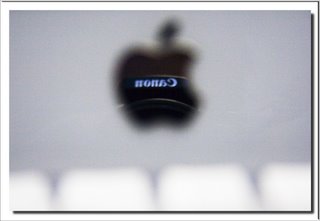Cappel

This shot was taken using one of the computer in Lincoln Building computer lab. I was actually supposed to do my HOI essay but HOI essay is so boring. Why not then take some picture on the reflective apple logo.
Apple Computer, Inc. is an American computer technology corporation with worldwide annual sales in its fiscal year 2005 (ending 24 September 2005) of US$ 13.9 billion [3] and 14,800 employees in several countries. Headquartered in Cupertino, California, Apple develops, sells, and supports a series of personal computers, portable media players, computer software, and computer hardware accessories. The company's most well known products include the Macintosh line of personal computers, the Mac OS X operating system, the iPod portable music player, and the iTunes media player. Apple operates retail stores in the United States, Canada, Japan, and the United Kingdom. The stores carry most of Apple's products as well as many third-party products and offer on-site support and repair for Apple hardware and software.
Apple has been a major player in the evolution of personal computing since its founding in 1976. The Apple II microcomputer, introduced in 1977, was a hit with home users. In 1983, Apple introduced the Lisa, the first commercial personal computer to employ a graphical user interface, which was influenced in part by the Xerox Alto. In 1984, the Macintosh (commonly called the "Mac") was introduced, furthering the concepts of a user-friendly graphical user interface, and also introducing the mouse for the first time in a personal computer. Apple's success with the Macintosh became a major influence in the development of graphical interfaces elsewhere, with major computer operating systems such as Microsoft Windows, the Commodore Amiga, Atari ST, all appearing on the market within two years of the introduction of the Macintosh. In 1991, Apple introduced the PowerBook line of portable computers, establishing the modern ergonomic form and design that has since become ubiquitous in the portable market. The 1990s also saw Apple's market share fall as competition from Microsoft Windows and the comparatively inexpensive IBM PC compatible computers that would eventually dominate the market. In the 2000s, Apple expanded their focus on software to include professional and prosumer video, music, and photo production solutions, with a view to promoting their computers as a "digital hub". It also introduced the iPod, the most popular digital music player in the world as of August 2006.[4]
According to surveys by J. D. Power, Apple has the highest brand and repurchase loyalty of any computer manufacturer. While this brand loyalty is considered unusual for any product, Apple appears not to have gone out of its way to create it. At one time, Apple evangelists were actively engaged by the company, but this was after the phenomenon was already firmly established. Apple evangelist Guy Kawasaki has called the brand fanaticism "something that was stumbled upon."[25]
Creative also recently filed a patent dispute alleging that Apple infringed on one of Creative's patents for their Zen player with the iPod and iPod nano.[40] However, on August 23, 2006, Apple and Creative settled their patent disputes for $100 million.
Apple Computer, Inc. is an American computer technology corporation with worldwide annual sales in its fiscal year 2005 (ending 24 September 2005) of US$ 13.9 billion [3] and 14,800 employees in several countries. Headquartered in Cupertino, California, Apple develops, sells, and supports a series of personal computers, portable media players, computer software, and computer hardware accessories. The company's most well known products include the Macintosh line of personal computers, the Mac OS X operating system, the iPod portable music player, and the iTunes media player. Apple operates retail stores in the United States, Canada, Japan, and the United Kingdom. The stores carry most of Apple's products as well as many third-party products and offer on-site support and repair for Apple hardware and software.
Apple has been a major player in the evolution of personal computing since its founding in 1976. The Apple II microcomputer, introduced in 1977, was a hit with home users. In 1983, Apple introduced the Lisa, the first commercial personal computer to employ a graphical user interface, which was influenced in part by the Xerox Alto. In 1984, the Macintosh (commonly called the "Mac") was introduced, furthering the concepts of a user-friendly graphical user interface, and also introducing the mouse for the first time in a personal computer. Apple's success with the Macintosh became a major influence in the development of graphical interfaces elsewhere, with major computer operating systems such as Microsoft Windows, the Commodore Amiga, Atari ST, all appearing on the market within two years of the introduction of the Macintosh. In 1991, Apple introduced the PowerBook line of portable computers, establishing the modern ergonomic form and design that has since become ubiquitous in the portable market. The 1990s also saw Apple's market share fall as competition from Microsoft Windows and the comparatively inexpensive IBM PC compatible computers that would eventually dominate the market. In the 2000s, Apple expanded their focus on software to include professional and prosumer video, music, and photo production solutions, with a view to promoting their computers as a "digital hub". It also introduced the iPod, the most popular digital music player in the world as of August 2006.[4]
According to surveys by J. D. Power, Apple has the highest brand and repurchase loyalty of any computer manufacturer. While this brand loyalty is considered unusual for any product, Apple appears not to have gone out of its way to create it. At one time, Apple evangelists were actively engaged by the company, but this was after the phenomenon was already firmly established. Apple evangelist Guy Kawasaki has called the brand fanaticism "something that was stumbled upon."[25]
Creative also recently filed a patent dispute alleging that Apple infringed on one of Creative's patents for their Zen player with the iPod and iPod nano.[40] However, on August 23, 2006, Apple and Creative settled their patent disputes for $100 million.

No comments:
Post a Comment